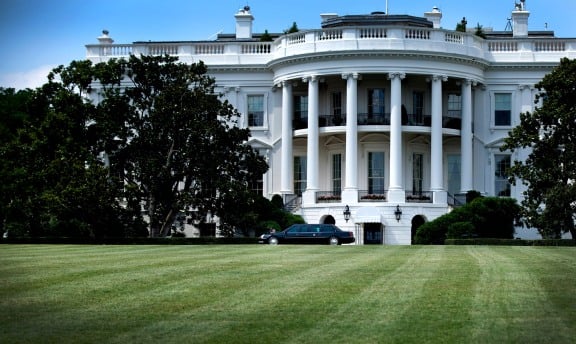Investors have fared far better under Democratic administrations; cause-and-effect or coincidence?
While Republicans promote themselves as the friendliest party for Wall Street, stock investors do better when Democrats occupy the White House. From a dollars-and-cents standpoint, it's not even close.
The BGOV Barometer shows that, over the five decades since John F. Kennedy was inaugurated, $1,000 invested in a hypothetical fund that tracks the Standard & Poor's 500 Index (SPX) only when Democrats are in the White House would have been worth $10,920 at the close of trading yesterday.
That's more than nine times the dollar return an investor would have realized from following a similar strategy during Republican administrations. A $1,000 stake invested in a fund that followed the S&P 500 under Republican presidents, starting with Richard Nixon, would have grown to $2,087 on the day George W. Bush left office.
“The market does tend to do better under Democrats than under Republicans,” Sam Stovall, chief investment strategist at S&P Equity Research in New York, said in a telephone interview. “Is it because Republicans mishandled the economy, or inherited a weak economy? I'll leave that to others.”
Some of the difference may stem from the fact that every Republican president since at least the end of World War II has faced a recession during his first term in office, Stovall said. Nine of 11 recessions that began since 1945 -- and seven of eight since Kennedy ran for president in 1960 --started with Republicans in the Oval Office.
Wall Street Republicans
Democratic administrations also may be more likely to spend money on government programs that stimulate the economy, Stovall said.
“I dare say that most people on Wall Street are Republicans,” Stovall said. “But it appears the bread is buttered on the Democratic side.”
The S&P 500 yesterday hit its highest intra-day level since June 2008 and closed at 1,362.21, the highest since last April 29. The benchmark index is up 8.3 percent so far in 2012, the biggest year-to-date gain at this point since 1991.
Since Kennedy took office, the Democratic S&P fund logged a 992 percent gain, versus 109 percent growth for the opposition party, even though Democrats occupied the White House for 23 years over the period, compared with 28 years of Republican presidential leadership.
The annualized return for 23 years of Democratic administrations is 11 percent, or four times the 2.7 percent annualized return during 28 years of Republican presidencies.
Democratic Edge
Investing $1,000 in funds that mirror the Dow Jones Industrial Average under the same conditions, Democratic investors would have had $7,550, versus $2,716 under Republicans.
The Democratic edge is so large that the party comes out ahead even without counting Bill Clinton (the Democrat with the biggest S&P 500 gain) and George W. Bush (the Republican with the worst market record). A hypothetical $1,000 investment under Democrats excluding Clinton was worth $3,539 versus $3,296 invested under Republicans except Bush.
Adding Dwight Eisenhower to the Republican column doesn't overcome the Democratic advantage, either: $1,000 invested in the S&P 500 in January 1953 would have been worth $4,796 after 36 years under Republican chief executives -- still less than half the $10,920 nest egg accumulated in 23 years under Democrats.
--Bloomberg News--







